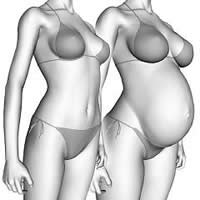- Citas Centro Médico de Caracas: Lunes, Miercoles y Viernes. Pulse el botón Agende una Cita
- Sistema de citas en linea exclusivo para Centro Medico de Caracas en San Bernardino
- Citas CMDLT: Jueves. llamar al 0212-9496243 y 9496245
- Las Emergencias son atendidas en CMDLT previa coordinacion personal al 04142708338
- Proveedor Seguros Mercantil y Sudeban

Are you pregnant and have you had a dream that has generated curiosity? You are not the only one. This is a very little considered and very interesting topic. It has been determined that pregnant women have more frequent dreams, more vivid, better remembered upon awakening, more varied and are related to the condition of pregnancy, the quarter in which it is and the bodily changes it is experiencing. The downside is that nightmares also increase.
What is the physiological, psychological meaning of dreams and why are they more frequent during pregnancy? Leaving behind the esoteric and Freudian considerations of dreams there must be an evolutionary reason to explain them, but it is an area of ??little and recent study and there are many unknowns. With the available evidence we will try to give some explanations for some of these approaches:
The most recognizable element in pregnancy is the hormonal elevation and its cerebral effects are notorious, the most likely explanation is that the hypnotic changes of pregnancy are due, in part, to its hormonal effects on the brain and its known interaction with the main neurotransmitters brain cells that have functions in sleep, memory, sleep, depression, contemplative states and mood swings
The pregnant woman sleeps more and therefore has more opportunity to dream and of course, to remember dreams. The modified brain environment could make dreams more vivid and colorful because of all the new external, bodily and cognitive information that, during waking, occurs in pregnant women.
Cognitive processes, thoughts, are also modified and it is common to observe this type of rumination, frequent cause of anxiety and feelings of personal incompetence and nightmares:
Will I be taking good care of my pregnancy?
Will I be doing something bad that could affect my baby?
Will I be a good mother?
I’m getting fat and getting ugly, will my partner stop loving me?
The content of dreams varies as the body of the pregnant woman changes throughout pregnancy, her dreams are echoes of her evolving condition and her fears and hopes associated with the arrival of the baby. Let’s see what Dr. Patricia Garfield PhD says, author of Creative Dreaming and founder of the Association for the Study of Dreams.
First trimester
During the first 13 weeks of pregnancy, the woman dreams a lot about issues related to fertility (gardens, fruits and flowers) and water (swimming, lakes, seas).
Water-related dream themes characterize this quarter and it is common to report dreams of the baby immersed in water, fish in their natural environment and the mother swimming (which seems to be a kind of identification of the mother with her fetus).
Second trimester
At this stage the fetus begins to feel in the maternal abdomen and begin to notice the changes of pregnancy that can no longer be hidden and the predominant dreams reflect changes in the human form and detectable activity of the baby and physical changes evident in the mother .
There are many dreams about small animals and other cultural elements that represent babies. On the other hand, there are many dreams that relate to changes in form and architecture that seem to be related to the evident changes in the maternal body.
Third trimester
In the final trimester of pregnancy, dreams tend to indicate things, to teach, to talk to the mother about the baby.
Dreams are more centered around the baby. The baby talks to the mother and tells her to be well or indicates the sex or the name she wants to have or has.
Also common are references to the unknown, such as dreaming about travel, preparing luggage, roads and nightmares related to labor, difficulties during childbirth, birth and pain.
In short, dreams during the early stages of pregnancy seem more colorful and less distressing than those of the last quarter, we imagine that the discomfort and economic preparations, administrative and impending birth pain condition much of these dreams. It is so exciting this interpretive theme of dreams that you may want to delve more about them in this wonderful collection (spanish).
The Nigthmares
If there is one thing we do know, pregnancy generates anguish, doubts and impotence, especially in the first pregnancy. As I mentioned earlier, the basic anguish is related to doubts about the ability to be a good mother, do things well during pregnancy and properly raise the baby.
Nightmares about fears and anxiety related to Labor, Delivery and Caesarean, Maternity and Lactation are very common and are reflected in nightmares that are very common at the end of pregnancy.
Typical dreams are about accidents with the baby, dropping it, not feeding it correctly, taking it away, getting sick or dying. These nightmares indicate anxiety related to the ability of the mother to care for the baby, even if the mother is calm there is always a certain degree of uncertainty and dreams, even if they do not seem nightmares and are considered normal, can generate some concern.
Nightmares or dreams with negative content should be taken seriously and discussed with the obstetrician since reporting, ruling out problems and strengthening self-esteem diminishes fears and anxiety. Adequate information avoids confusion and attenuates anguish and represents the best option to reduce negative dreaming reactions.
Sleep hygiene
During pregnancy it is difficult to find a comfortable position to sleep. The abdomen is heavy, the baby moves and can not continue sleeping the way she was used to.
At the beginning of pregnancy you can sleep as you did regularly, even on your back or upside down, but towards the end, the abdomen is so bulky and heavy that this last position is almost impossible to assume and in fact is counterproductive for you and your baby.

What is the reason for the discomfort to sleep?
• Increase in abdominal size
• Back pain
• Heartburn, esophageal reflux
• Difficulty breathing, dizziness and feeling faint
• Insomnia, vivid dreams, nightmares
What is the best position to sleep during pregnancy?
• The best position to sleep during pregnancy is “SOLE” (side sleeping). The “ideal” position is the left side but you can also sleep on the right side: the lateral position will increase the amount of blood and nutrients that reach the placenta and the baby, and prevent maternal hypotension due to compression of the great abdominal vessels. .
Note: if the baby moves a lot is because he is oxygenated and happy; This usually happens when you adopt any lateral position. For some reason many women think that it moves a lot because that position bothers them or hurts them, quite the opposite .
• To make the lateral position more pleasant you can assume the fetal position with bent knees and place a pillow between the legs.
• If you have back pain, you can place a pillow under the abdomen and another on the back while in the lateral position
• If you have heartburn or difficulty breathing during the night, you can place more pillows (usually 2-3 pillows are required)
There is no comfortable position during the end of pregnancy and sleep is frequently interrupted by urinary frequency, sudden movements of the baby, insomnia, nightmares and various pains …
I do not like sleeping on my side or on my back, I sleep on my stomach …
The owner of the body can think what she wants and try to do what she likes but nature will finally prevail, the uterus will grow so much that when lying on her stomach it will be impossible to be comfortable. The posture will naturally take you to one side or the other.